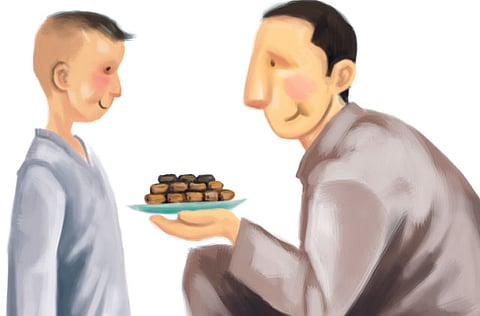Less is more during Ramadan
Begging, gluttony and extravagance should not be part of the month of fasting

I recently visited a superb exhibition in Washington, D.C. by a Korean artist and came away intrigued by her work, which depicted three quite shocking human characteristics — begging, gluttony and extravagance. As I made the return journey home to Dubai to spend the month of Ramadan close to my family and the beautiful sounds of the athan (call to prayer), I was bewildered to find those exact three characteristics prevalent in my own city. Not exactly what Ramadan is meant to be about, is it.
Ramadan is undoubtedly a month of giving and one of the pillars of Islam is zakat — the giving of 2.5 per cent of your annual income to the less fortunate — a noble initiative. Muslims are sincere about helping others, and particularly during this month. Upon entering our office building in the first week of Ramadan, I found myself surrounded by a sea of beggars sitting on the floor, and others keenly negotiating with the security guard to let them into the elevators. Witnessing a scene like that is heart-wrenching — who does not want to help people in need? Those same scenes can also be unnerving. Last year, Dubai Police arrested 618 beggars — of which more than half were caught during the month of Ramadan. Shockingly, most of these individuals were found to be members of organised gangs, many even travelling from abroad to shamefully profit from this month. Some of those prosecuted were even proprietors of real-estate businesses financed with money earned from begging.
Another noticeably contradictory characteristic to the essence of Ramadan is overeating. As people stress on how this month is about cleansing, detoxifying and empathising with people who have less food than ourselves, I find us doing the exact opposite. Although gluttony is quite a strong and repulsive word, it does describe the motions of people once the call to end the fast is heard. The massive explosion of food and beverage adverts on television during this month exemplifies the frenzy of self-indulgent feasting. As many households complete their first meals of the day, plenty of food remains as the sufra (dinner table) has been stacked with dishes from every country and origin, many sent by friends and family members. I recall an anecdote where one woman sent out a dish and it went round the entire city and ended up back at her house that evening. The overabundant food in this month of restraint and spirituality has in many cases made people careless and negligent.
My final concern is unnecessary spending. Although our society is consumption-orientated, and not just in this month or region, I would have liked to think that people would have taken steps given the time of year. As I walk through the malls I find that people are still overindulging in every product and item available.
Well-intentioned
Fasting is intended to teach Muslims the virtues of patience, humility and spirituality, and is carried out as an offering to God. This is the glorious intention of most Muslims, and many are to be applauded for their generosity and humility at this time of year. But things are not always as rosy as we would like them to be — reality does also come into the equation.
When it comes to the issue of begging, perhaps authorities should explore the merits of a rights-based approach. Professional begging violates human rights and integrity — especially the rights of the children and the disabled, who are often taken advantage of in harsh conditions. Professional beggars often mistreat children on the street in the interest of attracting attention and soliciting charity. In the battle against begging, authorities may also approach people in need via social aid teams, discussing the reasons individuals begin begging and proposing solutions. These same people ought to be directed to the social aid government departments and various charities that give out monetary assistance, as they can help to guide them. Defining instances of real social problems resulting from professional begging is key in turning this issue round.
As media play a substantial part in defining our thought process, it would be refreshing to see a responsible campaign reminding us of the humbleness and humility demanded by Ramadan. Instead of preparing an abundance of meals that go to waste, we may want to think of preparing less and spend the same amount of money on people truly in need. I would like to see the same campaign speak about the need for less extravagance in our society.
After all, if we are serious about respecting Ramadan as more than simply a tradition, then perhaps that respect should be reflected in as many areas as possible, so that the true spirit of it is felt in a tangible way by all who need it, and not just by those who can afford it.
Muna Al Gurg is a director at the Easa Saleh Al Gurg Group and vice chairperson of the Young Arab Leaders.



